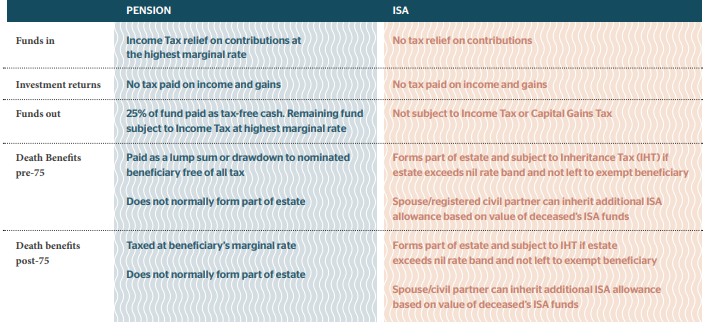Investors looking for tax-efficient ways to build a nest egg for retirement often look to both Individual Savings Accounts (ISAs) and pensions. Tax-efficiency is a key consideration when investing because it can make a considerable difference to your wealth and quality of life.
However, the type of investment and tax-efficiency is a common dilemma faced by many people. Which is better – an ISA or a pension? In truth, there’s a place for both, and it’s easy to argue the case for each of them. ISAs allow you to invest in the current 2019/20 tax year up to £20,000 each year, providing tax-efficient growth and income. Withdrawals are tax-free because the money paid in was from after-tax income.
Pensions are also very tax-efficient. All contributions within allowance limits receive tax relief from the Government payable at up to your highest rate of tax. For example, it would only cost a basic-rate taxpayer £80 to contribute £100 into their pension because they would receive tax relief at 20%. This is added to the £80, representing the 20% tax they would have paid if they had earned that £100. For higher earners, it is even better, with higher-rate taxpayers only needing to contribute £60 in order to boost their pension fund by £100, and additional-rate taxpayers only needing to pay £25 (assuming they have at least £100 of income taxed at those rates).
Tax relief is given on personal contributions up to 100% of your earnings (or £3,600 if greater).
If total contributions from all sources, including your employer if applicable, exceed the annual allowance (£40,000 for most people but can be less for higher earners or those who have flexibly accessed a pension), you will suffer a tax charge on the excess funding if it can’t be covered by unused allowances from the previous three years. So, pensions give you tax relief on money going in, but when it comes to drawing on your pension, tax will be payable at your marginal rate apart from the tax-free lump sum (normally 25% of your benefits).
ISA investments don’t allow for tax relief on the money being invested, but they do give you total tax exemption on any gains made within the ISA. So with an ISA, when you come to withdraw funds, you will not pay a penny of income or Capital Gains Tax. Put simply, the right option will be different for different people. There will be some for
whom the right answer is a pension, others for whom the right answer is an ISA. If it was clearly one or the other, it would be far simpler. An important point to remember is that you cannot normally access your pension until age
55, whereas your ISA is accessible any time.
Tax Comparison

INFORMATION IS BASED ON OUR CURRENT UNDERSTANDING OF TAXATION LEGISLATION
AND REGULATIONS. ANY LEVELS AND BASES OF, AND RELIEFS FROM, TAXATION ARE SUBJECT TO CHANGE.
A PENSION IS A LONG-TERM INVESTMENT. THE FUND VALUE MAY FLUCTUATE AND CAN GO DOWN, WHICH WOULD HAVE AN IMPACT ON THE LEVEL OF PENSION BENEFITS AVAILABLE. YOUR PENSION INCOME COULD BE AFFECTED BY INTEREST RATES AT THE TIME YOU TAKE YOUR BENEFITS. THE TAX
IMPLICATIONS OF PENSION WITHDRAWALS WILL BE BASED ON YOUR INDIVIDUAL CIRCUMSTANCES, TAX LEGISLATION AND REGULATION, WHICH ARE SUBJECT TO CHANGE IN THE FUTURE.
THE VALUE OF INVESTMENTS AND INCOME FROM THEM MAY GO DOWN. YOU MAY NOT
GET BACK THE ORIGINAL AMOUNT INVESTED.
PAST PERFORMANCE IS NOT A RELIABLE INDICATOR OF FUTURE PERFORMANCE.
INVESTORS DO NOT PAY ANY PERSONAL TAX ON INCOME OR GAINS, BUT ISAS DO PAY UNRECOVERABLE TAX ON INCOME FROM STOCKS AND SHARES RECEIVED BY THE ISA.






